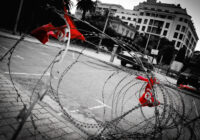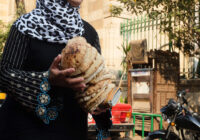The Yazidis of the Middle East have been persecuted for centuries. But who are they?
Since 2014, a unique ethno-religious community in northern Iraq/Kurdistan known as the Yazidis have been persecuted ruthlessly by the Islamic State (IS). The information within this article is built upon what Yazidi leaders feel in regard to inaccuracies in contemporary publications about their religion, including their most prominent figure, Sheikh Adi ibn Musafir. The media often emphasize the inhuman acts of IS against the Yazidis as theologically derived, but the interviewees clarified what the real culprit is behind their 700-year persecution.
Those interviewed were Yazidi religious leader Khurto Ismail Hajj (commonly referred as Baba Sheikh); Kurdish parliamentarian and the director of Shekhan Lalish Cultural Center, Pir Khidir; and the director of religious affairs in Shekhan, Mr. Hadi.
Religious Misconceptions
Many media outlets describe Sheikh Adi ibn Musafir, one of the most important personas in Yazidism during the 12th century, as a “reformer.” Others, in contrast, overemphasize his significance. For example, Yasmine Hafiz in The Huffington Post calls him the “founder” of Yazidism.
According to Baba Sheikh, Yazidism was derived prior to Sheikh Adi — closer to the beginning of creation. Although Sheikh Adi is not the creator, it does not deduct from his value. Specific qualities omitted from many depictions of Sheikh Adi in publications entail that he communicated directly with God; his name is honorably reiterated in Yazidi invocations today; he performed miracles during his time; his grave is venerated every year at the holiest site of Yazidis in Lalish Temple; and the Yazidis posit that he was the spiritual reincarnation of Tawuus Melak, an angel of God that appeared to Yazidis in the form of a peacock angel.
The preceding traits are often used to describe prophets. But this is contrary to how Yazidis venerate Sheikh Adi. Baba Sheikh mentioned that if there was a prophet in Yazidism, it would be Tawuus Melak, not Sheikh Adi.
This is an interesting disclosure that should be further expounded upon in the future by students of theology. That is whether a religious figure’s significance should be liberally defined according to general tenets of contemporary theology or strictly defined according to precisely how the adherents and leaders of a religion proclaim. Sheikh Adi meets a plethora of criteria qualifying him as a prophet for many religions, but religious leaders such as Baba Sheikh and the majority of Yazidis generally consider him more than a reformer, but not a prophet.
The majority of publications on Yazidism also mention that Yazidi traditions are oral as opposed to written. Billy Hallowell of The Blaze states: “Yazidis primarily pass on their traditions orally, which makes pinning down all of the contemporary and historical elements somewhat difficult.”
This is partially true. Baba Sheikh disclosed that one eclectic holy book did exist, but it was stolen. He said Arabs, Turks or Persians stole the book instead of the British, which a few journalists currently claim. Therefore, Yazidism may in fact primarily rely upon oral tradition, but there is a written canon akin to the Bible or Quran. Its location is still a mystery today, though. It is also important to note that Yazidis rely upon two incomplete texts that are currently in existence: the Black Book and the Book of Revelation.
Although the societal myth about Yazidism being a religion of devil worship has been dispelled, there still remain slight misconceptions. For instance, Raya Jalabi in The Guardian postulates that Yazidism “has taken elements from each [monotheistic religion], ranging from baptism (Christianity) to circumcision (Islam) to reverence of fire as a manifestation from God (derived from Zoroastrianism) and yet remains distinctly non-Abrahamic. This derivative quality has often led the Yazidis to be referred to as a sect.”
This is incorrect. Pir Khidir, in his interview, divulged that Yazidis cherish Abraham as a major prophet and that Yazidism’s legitimacy relies upon Abraham within its narrative. In fact, as with Jewish and Islamic traditions, yet dissimilar to Christianity, the battle between King Nimrod and Abraham is mentioned by Sheikh Adi as he stated: “I was present when Adam was living in Paradise, and also when Nimrod threw Abraham in the fire.” In other words, the doctrine of Yazidism is indeed Abrahamic.
Other misconceptions pertaining to the Yazidi religion derive from misinterpreting tribal actions as resulting from Yazidism’s precepts. Justin Huggler of The Telegraph states: “There are darker sides to the Yazidis. They have a tradition of killing any of their members who leave the religion, and 2007 it was reported that Du’a Khalil Aswad, a Yazidi woman, was stoned to death for converting to Islam and marrying a Muslim man.”
Both the murdering of women for marrying outside of the religion or for apostasy in general and the tragic death of Aswad specifically were non-normative events that the Yazidi community publicly shun today and say resulted from solely tribal practices. These tribal practices are similar to Muslim and Christian communities in the Middle East and South Asia, in what has been termed “honor killings.”
Mystery of Persecution?
What makes the Yazidis’ horrific tribulations so much a riddle is the intriguing case that, because it amalgamates so much of various religions, one would comfortably expect solid bridges of tolerance to be cemented. Similar to Islam, Yazidis cleanse their hands and body prior to prayer and pray five times a day. As with Judaism, Yazidis revere the color blue as holy, and they baptize their children as Christians do. Yazidis also refrain from certain edibles such as lettuce, much like Muslims and Jews refrain from pork and Hindus banning beef.
Pir Khidir interestingly revealed that Yazidis even possess the Christian concept of the trinity with God, Tawuus Melak and Sheikh Adi. Furthermore Jesus, Muhammed, Moses, Noah and more monotheistic figures and events are acknowledged in the remaining Yazidi scriptures. Most importantly, some salient principles Yazidism shares with most religious theologies as Baba Sheikh accentuated is to do good deeds selflessly for other humans, regardless of their religion and regardless of public recognition or personal rewards. Pir Khidir insisted: “We pray for others first, then we pray for ourselves … we respect all humanity.”
Pir Khidir added more suspense to the puzzlement of the persistent persecution of Yazidis. He stated that Yazidis do not have a record of aggressiveness against other religions or cultures. “We always defend ourselves,” he said in highlighting the benign nature of the Yazidi people. For instance, Yazidi hero Hemoye Shero hid 20,000 Christians in caves during the Armenian genocide in 1915 and, as a consequence, Yazidis were ferociously punished by the Ottomans in a two-month siege of Sinjar Mountain. Baba Sheikh added that the Yazidis have never participated in meting out such brutality that they have suffered for seven centuries such as beheadings, forced conversions, rape and slavery.
Finally, Pir Khidir averred that Muslims, Jews, Christians and others should have no legitimate ideological anxiety from the Yazidis, because conversions are not permitted from or to the Yazidi religion. Thus, there is no ideological hazard from the Yazidis in regard to proselytizing.
 Pir Khidir and Hadi mitigated the hypothesis that the Yazidis’ persecution is not actually about ideology — it is all about avarice. Both of them said that when economic tribulations occur or easy financial gain is apparent, the innocuous Yazidis have always been unjustly demonized into the enigmatic evil scapegoat by neighbors. That victimization, according to them, has always been about land but, today, it has transformed into a competition for oil and land. This is not solely from envious neighbors preying upon the weaker Yazidis, but from higher authoritative entities that either directly enable it or simply turn a blind eye.
Pir Khidir and Hadi mitigated the hypothesis that the Yazidis’ persecution is not actually about ideology — it is all about avarice. Both of them said that when economic tribulations occur or easy financial gain is apparent, the innocuous Yazidis have always been unjustly demonized into the enigmatic evil scapegoat by neighbors. That victimization, according to them, has always been about land but, today, it has transformed into a competition for oil and land. This is not solely from envious neighbors preying upon the weaker Yazidis, but from higher authoritative entities that either directly enable it or simply turn a blind eye.
Hadi personally expressed that the Yazidi community are deeply distrustful and adamantly fearful of their Muslim neighbors, as well as resentful toward Western powers and the Iraq/Kurdistan authorities. In general, Yazidis are in pessimistic disbelief that the Islamic State could rise to overwhelming power so quickly and commit their barbarous acts without someone aiding them. Pir Khidir echoed Hadi’s disbelief, stating that it is incredulous that Western nations could not deter IS, especially after easily removing Saddam Hussein in 2003. Hadi, in similar criticism regarding the lack of intervention in the 1994 Rwandan genocide, emphatically stressed: “If there was a European or US embassy in Sinjar Mountain, if there were two oil pipelines underneath Sinjar, none of this [genocide by IS] would have happened.”
Future of the Yazidis
Baba Sheikh asserted that the future of the Yazidi community has been mercilessly destroyed and, without America’s help, it will remain so. Hadi added that forming an autonomous state for the Yazidis and other religious minorities in northern Iraq/Kurdistan, like Montenegro, is the only viable solution for deterrence of persecution, ethnic cleansing and ending discrimination. He also expressed concern — like Baba Sheikh in his interview with Cale Salih of The New York Times — about the prosperity of the Yazidi religion in regard to the proliferating number of refugees fleeing northern Iraq/Kurdistan to foreign nations and converting to other religions.
Hadi and Pir Khidir also emphasized the detrimental effects of the IS genocide of Yazidis is also psychological. Interfaith programs repairing the distrust and fear between Yazidis and their Muslim neighbors are needed. Additionally, some mosques and schools indoctrinating anti-Yazidi propaganda need to be stymied. Finally, a thorough and official investigation of how IS rose to power and conducted ethnic cleansing, and highlighting and questioning the northern Iraq/Kurdistan government and the international community’s responses is unavoidable, if inter-community relations are to be successfully repaired.
Whatever the future of the Yazidis, they have resiliently endured much over the course of 72 extermination attempts. Whether the animosity by their neighbors stems from economic or theological issues, history demonstrates that groups such as the Yazidis mostly become victims of some ruthless outsider or neighbor. Such communities occasionally survive or suddenly become stronger by becoming exogamous and accepting proselytizing, as the Jewish in Israel.
This is a decision the Yazidis must consider themselves. History also demonstrates that via persecution, such as with the Falun Gong in China, certain religions become more known and sometimes even more popular.
The genocide against the Yazidis will pose the inquiry to all of humanity today if such endogamous and exclusive communities can live on their own accord without being punished and persecuted as an “other” by ignorant and greedy war mongers. Or will international intervention and perhaps even the formulation of autonomous zones be necessary to protect such unique groups?
*[The author would like to thank Awaz Khalil of her assistance as a religious and cultural liaison and translator.]
The views expressed in this article are the author’s own and do not necessarily reflect Fair Observer’s editorial policy.
Photo Credit: Answer 5 / Shutterstock.com
Support Fair Observer
We rely on your support for our independence, diversity and quality.
For more than 10 years, Fair Observer has been free, fair and independent. No billionaire owns us, no advertisers control us. We are a reader-supported nonprofit. Unlike many other publications, we keep our content free for readers regardless of where they live or whether they can afford to pay. We have no paywalls and no ads.
In the post-truth era of fake news, echo chambers and filter bubbles, we publish a plurality of perspectives from around the world. Anyone can publish with us, but everyone goes through a rigorous editorial process. So, you get fact-checked, well-reasoned content instead of noise.
We publish 2,500+ voices from 90+ countries. We also conduct education and training programs
on subjects ranging from digital media and journalism to writing and critical thinking. This
doesn’t come cheap. Servers, editors, trainers and web developers cost
money.
Please consider supporting us on a regular basis as a recurring donor or a
sustaining member.
Will you support FO’s journalism?
We rely on your support for our independence, diversity and quality.






